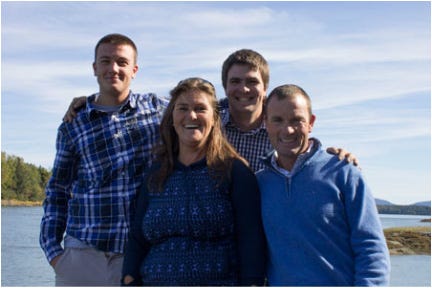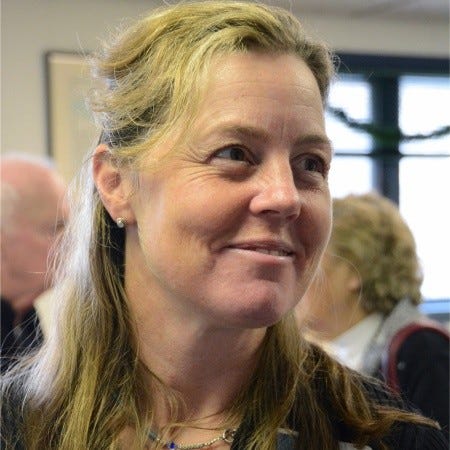Battle for future of Frenchman Bay entering critical period of farm lease consideration

HADLEY POINT - The timing couldn’t have been worse for Fiona De Koning, with two aqua farms applying for leases with similar names around the same time.
The applications are for unprecedented farming in one of the most unspoiled bodies of coastal water in North America - Frenchman Bay.
De Koning wanted it be known that her family runs Acadia Aquafarms, and have been doing it for 16 years, and they have nothing to do with American Aquafarms, the Nordic company which wants to build two 60-acre salmon farms in Frenchman Bay.
Acadia raises and harvests mussels, which do not require feeding and do not pollute the water with their excrement. Fiona met QSJ at Hadley Point, which at low tide, appears to be a stone’s throw from Lamoine. De Koning’s family owns five leases near here totaling 150 acres, processing mussels. They have applied for new leases to operate a 68-acre mussels farm and a 52-acre scallop farm.
“We farm mussels using the bottom culture technique, which is using the seafloor and no gear suspended from the surface of the water. As this is just two dimensional, the acreage is logically going to be higher than growing in a cube of water hanging on gear floating on the surface ( smaller acreage footprint needed),” De Koning explained.
“The marine farms in Frenchman Bay have worked for years alongside everyone else with a very low public profile, which has been due to the fact that we all depend on each other and our neighbors and colleagues in the other marine industries to make a living.”
But the 52-acre site for scallops farming is within a chip shot of the MDI Bio Lab in Salisbury Cove where Jeri Bowers, director of development, asked, “How many (aqua farms) is too many?”
There are four applications pending, including Acadia’s two and American’s one for two sites, along with seven existing leases for smaller farms, and eight leases of limited duration (year or two), Bowers said. “What is the cumulative effect on Eastern Frenchman Bay?” The state has no mechanism to limit the number of farms, only to limit the number per applicant. The four applications, if approved, would double the current acreage for aqua farms, she said.
“Those four applications represent more than 50 percent of the acreage that's currently leased,” she said. “I suspect we're seeing a trend for bigger leases, larger footprint.”
Bowers is part of a rag tag consortium of citizen groups trying to rally around a common cause to halt the fish farm expansion.
“I have sort of by default been leading a group called friends of Eastern Bay of about 80 stakeholders that either do business on the Bay or they're landowners in that kind of upper part of the Bay which seems to be a popular spot for aquaculture.
“we've been meeting regularly, just sort of trying to figure out how do we create, how do we raise concern without harming these small, independent aquaculturists, but at the same time, begin to ask the question how many is too many and how big is too big. And that's really difficult to determine.
“If you look at Acadia Aquafarms, as an example, they have two pending applications and they're two very different scenarios,” Bowers said.
The De Konings hope to use “collector” technology to harvest scallops near MDI Bio Labs, and it’s unclear how many collectors will be in the water and how intrusive they will be to marine navigation and to bay aesthetics.
“So one is completely submerged and really is not an impediment to navigation or at least in theory to Marine mammals. But the other, I think you can't really say that's true. So how do you come up with a regulatory process that takes that into account? I don't know, but I know that we need to have that conversation,” said Bowers.
“Climate change causing seed settlement to change making the future very uncertain for our mussel farm,” De Koning wrote in an email. “We spent five years trying various techniques and researching the best system to collect seed from the water (rather than waiting for it to settle on the sea bed and then carefully harvesting as we do now- protocol with the state).
“We had a hydrodynamic model to show where the spawn traveled from the farms to show where best to ‘catch’ it. We had to place the collector in deep water but away from existing fisheries, and other criteria. These collectors are tried and tested over many years in many places globally.”
Bivalves are said to have a positive benefit for the environment. Wikipedia: “Contrary to common perception concerning the negative impacts of many aquaculture practices (particularly fin fishes), scallop aquaculture (and indeed other shellfish aquaculture practices) in many parts of the world are considered to be a sustainable practice that can have positive ecosystem effects.” In other words, they actually clean the water.
Not so for fin fish farms such as ones proposed by American Aquafarms, which has been greeted by a storm of negative reaction.
This week, Bowers’s coalition of Protect Maine’s Fishing Heritage, Friends of Frenchman Bay, Friends of the Schoodic Peninsula, Save the Bay and Friends of Eastern Bay wrote DEP Commissioner Melanie Loyzim:
“We represent people from communities surrounding Frenchman Bay: year-round and seasonal residents; fishermen, lobstermen, clammers, wormers, aquaculturists; scientists; businesspeople from tourism, hospitality, retail and other industries; educators; healthcare and legal professionals, vacationers; environmentalists; many of whose families have treasured and preserved the Bay for generations.
“We are united in opposition to the installation of experimental, industrial scale semi-closed finfish pens that are unplanned, inappropriate and dangerous for our Bay, which is the most popular on the Eastern seaboard, abutting a treasured National Park that is lovingly protected and prized for its natural habitat, unmarred vistas and pristine beauty. It will upend our economy which is symbiotic and balanced with tourism/recreation; sustainable fishing, farming and harvesting of marine flora and fauna; science; education; businesses serving seasonal visitors and supporting the year-round population.
“Since a project of this type and scale (30 huge semi-closed pens projected to raise 66,000,000 million pounds per annum) has never been installed anywhere in the world, no pertinent experiential data can exist. In order to evaluate their modeled and projected assumptions, DEP and we will need access to comprehensive data in a timely manner that will allow us to fully evaluate them, with experts and lawyers if need be, and to prepare an informed response.
“They (American Aquafarms) have reacted to a casual comment by one lobsterman about ocean bottom characteristics by moving their site; another lobsterman claims the new site is just as important to them because lobsters move all around the bottom. They claim they went from underwater electric cable supply to generators to appease the lobstermen; did they consider the environmental impact of the huge generator capacity they would have to install?
“American Aquafarms is a Wyoming-registered, Norwegian company helmed by a Norwegian gentleman whose background is in finance not fishing. He readily admits to having been convicted of investor fraud and sentenced to four years in prison, of which he served over two, and was fined a significant sum. The parent company is privately owned by foreign investors; the company has indicated interest in Pine Tree Zone exemption from State taxes; the financial profits will flow to the investors and private consulting firms, not to the State of Maine or its residents.”
Nordic salmon farming has been the subject of numerous investigative journalism. Here is one:
How will membership change on MD planning board affect Hall Quarry?
SOMESVILLE - The happiest person - perhaps the only one - at Monday’s outdoor Mount Desert Planning Board hearing was outgoing member Joanne Eaton, who skedaddled out of the parking lot after the hearing ended, ducking questions from QSJ as she hustled to her car.
Eaton had just attended her last meeting as a board member, resigning two years before her term was up. A second member, Meredith Randolph, is also term expiring. She has not disclosed publicly whether she will seek re-appointment.
Tracy Loftus Keller, who has been serving diligently as an alternate board member, should be an obvious choice to replace Eaton.
The shift is important as Eaton was seen as being unsympathetic toward the plight of Hall Quarry residents who oppose the re-opening of a quarry business in their midst primarily because of noise.
The board spent the entire hour and 42 minutes airing an issue board counsel James Collier said was a “simple, minor matter” - the finding that the quarry was in a “non-conforming” lot because the access road was not up to code, which requires a 50-foot width for subdivisions exceeding a certain number of lots.
You may view the entire meeting here … https://youtu.be/W-8K0cTmQX8
Lawyers for the abutters, other neighbors and a couple across Somes Sound objected to a request for a waiver from the code filed by the quarry owner the Friday before the Monday hearing at 4:06 p.m., saying many stakeholders did not have enough time to evaluate the issue.
This came against the backdrop of Collier’s admission that he was negotiating the road issue with applicant for 18 months without the knowledge of the planning board and despite the reservation about the secrecy from Code Enforcement Officer Kim Keene.
During that period Ed Bearor, counsel for quarry owner Harold MacQuinn, was able to obtain an “easement” to expand the road. However, Matthew Manahan, counsel for the Somes Sound couple, found that easement required MacQuinn to seek permission from landowner Michael Musetti for every activity on the road. According to Dan Pileggi, counsel for the abutters, it was less of an easement than a “permission” document.
Despite obtaining the “easement,” Bearor wanted the board to waive the requirement to upgrade the road.
The board adjourned the hearing to give Bearor time to come back with more detailed explanation of his waiver request.
Quietside emergency services get airing; residents want better coverage
SOMESVILLE - Only 2.2 percent of the the town’s votes were needed to approve building a new public safety facility in Northeast Harbor. The vote was 46-18 for $357,500 to begin design.
The meeting was notable for confusion among speakers about the town’s proposal.
Former school principal Scott McFarland said he supported the plan after hearing that the town proposes to station full-time personnel in Somesville which would cut response time to Pretty Marsh by 10 minutes.
“The beauty of the town meeting is that it’s the time where you can get the facts and information squared away instead of just hearing what different people are saying about it. I have to admit when I first was hearing about this sitting in my car and being a resident of Pretty Marsh .. I didn’t know that you had private funding to have personnel in Somesville which is huge.”
The private ambulance service, which is shutting town in 2023, agreed to pay for a concept to repurpose the Somesville firehouse for two 24/7 responders.
But several speakers wanted the town to do more and actually build a new facility on the western side of town instead of Northeast Harbor. James Bright, who sits on the Zoning Board of appeals, came to the microphone four times to make this case. John Adams, warrant committee member, spoke three times. You may watch the entire meeting on Youtube. https://www.mdislander.com/maine-news/voters-ok-fire-ems-expansion-planning
The firehouse discussion took 30 minutes of the two-hour meeting, starting at 34 minutes in.
Once both design concepts are completed, it is likely a special town meeting will be called to consider the new building in Northeast Harbor and the renovations in Somesville. The results will be full-time ambulance and fire responders in both parts of town.
The 65 voters who attended met the town charter requirement for a quorum of at least 50 voters. QSJ has pointed out in the past that Maine town meetings are the least democratic institutions in the country where often less than 5 percent of the citizenry decides how and what to spend tax money on. There are 2,038 registered voters in the Town of Mount Desert.
BDN reporter continues to question statements by recycling plant operator
SOMESVILLE - Does Delta Thermo Energy have a waste disposal plant in Pennsylvania or not?
The Bangor Daily News wants to know.
Apparently, the Municipal Resource Committee, which is about to hand the keys over the DTE to run the 115-town recycling plant in Hampden, isn’t as interested.
Reporter David Marino Jr. for the influential paper asked MRC director Michael Carroll if he had the answer. Carroll was quoted as restating DTE Rob Van Naarden’s claim that he runs a “test facility” in the Williamsport, Pa. area.
Jim Vallette, vice chair of Southwest Harbor’s warrant committee, had asked Van Naarden April 28 how many plants DTE currently operates to which Van Naarden said two - one in New Jersey and one in Pennsylvania.
Upon further questioning, Van Naarden admitted the New Jersey plant closed several years ago, leaving only the one in the “Williamsport area.”
Now Carroll is quoting Van Naarden as saying the plant in Pennsylvania is a “test facility.”
BDN reported it could find no plant operated by Delta in that area of Pennsylvania.
“The Pennsylvania Department of Environmental Protection has no permits on file for such a test facility, which would need permits for emissions and wastewater discharge to operate,” the paper reported this week. “An official at the tax assessor’s office for Lycoming County, where Williamsport is located, said it had no properties listed as being owned by Delta Thermo Energy or “DTE.” (The company’s Maine business entity is called DTE-HM.)”
Here is the article:
MRC’s method of conducting “due diligence” apparently is simply to ask Van Naarden. There appears to be no curiosity on the part of Carroll nor members of the MRC board and staff whether Van Naarden’s representations are accurate. The same board selected Fiberight to build the $90-million plant which was closed in less than a year of operations when the company ran out of money. It has been closed now for more than a year. The municipal waste from the 155 towns are now going to landfills.
Tony Smith, public works director of Mount Desert, sits on the board and is chair of the Acadia Disposal District which represents most of the Quietside. Other board members are Jim Fortune of Cranberry Isles, Robert Roxby of Frenchboro, Carey Donovan of Tremont and Martha B. Higgins of Trenton.
THE PUZZLE
Lincoln’s Log
QSJ's May 1 post set a single day record of 4,179 views - Will poor service plague MDI restaurants? How long can MRC ignore DTE CEO's 'misstatements?" Why Tremont selectmen vote is important; Climate change driving people to Maine, says Knowles broker …
QSJ has applied to be part of a Substack task force exploring ways to bolster local journalism on its platform. Please voice your support for my application by writing to support@substack.com.
Only two weeks left before tickets are required to ascend Cadillac Mountain in Acadia National Park. The park will charge for parking May 23 to Oct. 19. You may buy the tickets on recreation.gov. Jordan Pond restaurant is scheduled to open May 19. Wise to go before Memorial Day.
Alison Kiger, co-director of the Bar Harbor Music Festival, is seeking rehearsal space for the Garden State Philharmonic Brass Quintet June 29 from 7 to 10 p.m. or 6 to 9 p.m. The quintet is scheduled to perform at the Criterion Theater June 30.
QSJ is seeking to rent an office with wifi June 6 to June 18 for two visitors who need to work remotely. Rely to this email if interested.









